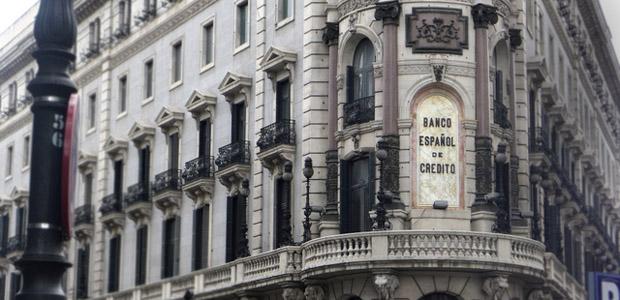Spanish community banks, cajas, took many risks, lacked oversight
Spain’s Credit Bank, in Madrid. The bank’s name is a little ironic these days, as Spain’s banks have virtually stopped lending, because they’re already bogged down by failed loans, mainly in construction. (Photo by Gerry Hadden.)
Isabel Cambronero, a classical dance teacher from southern Spain, was on her honeymoon in 2007 when she got a phone call from the head of a local savings bank called Caja Mediterraneo.
The banker told Cambronero she had been chosen to sit on the bank’s control board. Cambronero said she was surprised and told the guy she doesn’t know much about finance.
She said the banker told her it didn’t matter and that “you just need common sense.”
Cambronero was chosen for the control board job through a lottery – a lottery for customers. These cajas, essentially old-fashioned main street savings banks, not-for-profits – reserved some seats on their oversight commissions for depositors, and chose them by pulling their name out of the proverbial hat.
Cambronero accepted the job and the roughly $30,000 a year it paid to go to a few meetings and rubber stamp the bank’s investment plans. It seemed to her a great arrangement.
“In all my time on the board I never saw anything questionable,” she said. “Everything had the OK of the bankers. I never knew we were in crisis.”
Until 2011, when the Bank of Spain was literally intervening to save the caja. Cambronero’s story is driving lawmakers nuts. Cambronero has been telling it to a parliamentary committee, in Valencia, Spain, where the bank was located.
“How is it possible that everyone just believed what the bankers told them, without questioning anything?” one incredulous lawmaker asked. “It isn’t logical. For example, did you know that your bank had money in fiscal safe havens?”
Cambronero said what’s crazy is to not trust the people working for the bank.
“It was their bank, and mine,” she told parliament in her final testimony last Monday. “I hold it very dear. It was like a second home. It doesn’t occur to you that they’re going to do their work badly. It’s like when you go to the doctor, you have no reason to doubt his word.”
Critics of Spain’s cajas say besides clients, the control boards were stacked with political appointees, who earned lots of money, and who had an interest in turning a blind eye to bad acts
Up until the economic crisis, some 45 cajas, controlling nearly half of Spain’s financial system’s assets, had essentially no reliable oversight.
What exactly did they do wrong? First, here’s what they used to do well.
They lent locally, to neighborhood businesses and to families. This worked for more than a century.
Then came the construction fever of the 1990s. That’s when things started to unravel. When Caja Mediterraneo collapsed last year, it was investing $98 out of every $100 in “ladrillos” or bricks and mortar. And then the construction bubble in Spain burst.
But it got worse, because lately, instead of making loans to struggling Spaniards, the cajas have been dealing in Spanish government bonds.
This means that if the banks go under, they could drag the government with them, and vice versa.
Economists call this a feedback loop. Like, an electric guitar too close to an amplifier, where the squealing gets louder and louder, the banks and government need to be separated from eacier other.
But economists and European officials say for that to happen, European banking rules need a radical overhaul – an overhaul that could take years.
